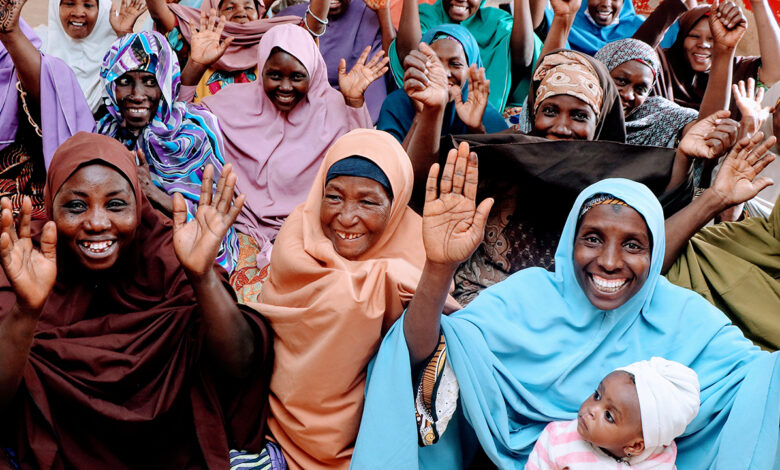Calls for gender equity, protection of women’s rights resonate

• Senate Committed To Eliminating Barriers To Women’s Progress In Nigeria – Akpabio
• Lagos Rallies For Women’s Empowerment
• Experts Advocate Family Planning For Women, Improved Access To Health
• SIFAX Group Empowers 500 Young Girls
As Nigeria joins the rest of the world to mark this year’s International Women’s Day (IWD), stakeholders have harped on the need to fast-track the implementation of policies geared towards enhancing gender equity and safeguarding of women’s rights in Nigeria.
The calls were made in line with this year’s theme of the event, ‘Accelerate Action’, which seeks to catalyse actions towards achieving gender parity across the globe. Against this backdrop, the Senate has declared its commitment to enacting legislation aimed at eliminating barriers to women’s progress in Nigeria.
The upper chamber also pledged to ensure 35 per cent affirmative action for women in the National Assembly and governance processes, aligning with the National Gender Policy (NGP) and the United Nations Convention on the Elimination of All Forms of Discrimination Against Women.
The President of the Senate, Godswill Akpabio, made this commitment at an event held at the Old Senate Chamber, National Assembly Complex, Abuja, with the theme, ‘Economic and Political Inclusion: Walk the Talk’.
The programme was attended by the Deputy President of the Senate, Barau Jubrin; Senate Leader, Opeyemi Bamidele; Minister for Women Affairs, Hajia Imaan Sulaiman-Ibrahim, among others.
Addressing the audience, Akpabio reaffirmed lawmakers’ resolve to dismantle all obstacles hindering women’s socio-economic advancement and gender equality in Nigeria.
He said: “We are discussing how women will have a strong presence not only in the National Assembly but also across the country. We will do all we can to promote gender equality, even if it means amending the 1999 Constitution.
“Credible evidence has shown that women are excellent managers. Sometimes, they work harder than men. We must return to a time when women played key roles in all spheres of life, contributing to our collective progress and prosperity.”
Sulaiman-Ibrahim, who also spoke at the event, underscored President Bola Ahmed Tinubu’s commitment to women’s progress. She revealed that the President has increased the budget of the Federal Ministry of Women Affairs by 1,000 per cent .
“Women in this country have made significant strides across various sectors. We must continue to work on ourselves and promote initiatives that will further advance women’s progress and gender equality,” she said.
In Lagos State, Governor Babajide Sanwo-Olu also called for gender equality, emphasising the urgent need to move beyond rhetoric and implement tangible measures to empower women.
The governor, who made the call on Friday when he led his wife, Ibijoke; the Commissioner for Women Affairs and Poverty Alleviation, Bolaji Cecilia Dada and others to mark this year’s IWD celebration, noted that the theme, ‘Accelerate Action’, serves as a clarion call to move beyond rhetoric and take bold, decisive steps towards achieving gender equality.
Sanwo-Olu, in his address at the event, which had participants from the 20 local councils and 57 Local Council Development Areas (LCDAs) of the state, highlighted the global significance of the IWD and the 30th anniversary of the Beijing Declaration, which he described as a landmark document for women’s rights.
He noted that Lagos State is committed to bridging the gender gap through deliberate policies and initiatives, disclosing that programmes like ‘HE for SHE’ aim to foster inclusivity and ensure that women are not just seen but empowered. He said: “The state has invested heavily in skills acquisition centres and the Women Development Centre, providing free training to equip women for economic independence.
“Our policies are dedicated to protecting women from gender-based violence while also creating opportunities for them to assume leadership roles.”
Sanwo-Olu called for collective action, urging men to join the movement for gender equality. “True progress requires collective action, because gender equality is a societal imperative,” he said.
The governor commended his wife for her advocacy in maternal and child healthcare. He also expressed gratitude to his deputy and other officials for their support. He warned that achieving gender parity at the current pace could take over five generations, demanding urgent action .
In her remarks, Dada stressed that the time for slow progress was over. The Women Affairs and Poverty Alleviation commissioner highlighted the persistent challenges of gender inequality, economic disparity, and gender-based violence, calling for collaborative efforts from all stakeholders.
“We must move beyond promises to practical solutions that will empower women and uplift the vulnerable. The Ministry has been committed to supporting women through empowerment programmes, training, and advocacy, creating platforms for financial independence,” Dada said. She emphasised the importance of education, mental health support and combating violence against women.
“An educated woman is an empowered woman,” she noted. She further noted the importance of providing safe spaces and counseling services, while also calling for stricter laws against gender-based violence.
Dada urged law enforcement agents and community leaders to join hands in creating a violence-free society. She also advocated for more women in leadership positions, emphasising the need to break down barriers hindering their participation.
“Let us not wait for another year to make change happen; let us start today,” she noted. Similarly, stakeholders have highlighted the important role of family planning in advancing women’s rights and empowerment.
According to the Communication/Knowledge Management Officer at DevComs, Suliyat Eletu, access to family planning services enables women to complete their education, participate in the workforce and contribute meaningfully to society.
“Also, childbirth spacing significantly reduces maternal and infant mortality rates, promoting healthier families and stronger communities. This year’s theme, ‘Accelerate Action’ calls for rapid advancements in gender equality. It focuses on recognising strategies and tools that drive women’s progress in education, employment and leadership. We strongly support the theme through accelerating women’s access to family planning, which is more than just a health intervention; it is a catalyst for gender equality, economic empowerment and sustainable development,” she said.
Country lead at The Challenge Initiative (TCI), Dr. Taiwo Johnson, noted that allowing women to make informed choices about their reproductive health and family planning ensures better health outcomes, improved economic opportunities and enhanced quality of life for families and communities.
TCI has been supporting the government of Nigeria since 2017, providing technical support to 22 states across the country for a sustainable local response to the needs of women and families.
According to Johnson, family planning is a cornerstone for advancing many sustainable development goals including SDG 3 (Good Health and Well-being); SDG 4 (Quality Education); SDG 5 (Gender Equality); SDG 8 (Decent Work and Economic Growth); SDG 10 (Reduced Inequalities) and SDG 13 (Climate Action) .
She noted that despite significant efforts, challenges continue to hinder family planning accessibility in Nigeria, including cultural and religious resistance, stock outs of family planning commodities due to supply chain disruptions, poor funding and policy gaps, misconceptions and myths discouraging contraceptive use and limited male involvement in family planning decision-making.
Others include poor healthcare access, especially in rural and conflict-affected areas and poor logistics management systems affecting family planning commodity availability.
To sustain the gains of family planning for the future, she said Nigeria must ensure continued progress by institutionalising family planning training in medical and nursing schools, strengthening family planning commodity security through improved supply chains, integrating family planning into Universal Health Coverage (UHC) programmes, fostering community ownership through collaboration with CSOs and traditional leaders as well as expanding government commitment to family planning budgeting and funding.
Also, as part of the commemoration, SIFAX Group has empowered 500 female students of Apapa Senior High School through mentorship, education, career talks and essential supplies such as sanitary pads and notebooks.
The firm noted that the outreach was in line with this year’s global theme of the event, highlighting the importance of investing in girls’ education and fostering future female leaders.
The event featured motivational talks from senior female executives at SIFAX Group, including Group Head, Marketing, Catherine Abuah; Head,Oil Monitoring, Kate Damasus; Head, Stevedoring, Pat Nwaogwugwu, Head, Corporate Communications, Sky Capital, a subsidiary of SIFAX Group, Onyinye Emenike and Head Nurse, SIFAX Group, and Juliet Eges.
The speakers shared their career journeys, emphasising resilience, hard work, and the importance of education. Abuah, reflecting on her background, said: “Education is not a scam. It opens doors, breaks the cycle of poverty, and empowers girls to shape their future.” She encouraged the girls to pursue knowledge, work diligently, and uphold strong values, emphasising that their dreams are achievable through dedication and integrity.
A key session at the event focused on breaking gender barriers and achieving financial independence, where students raised questions about cultural expectations and the role of ethics in success and got responses from the resource persons.
Through the outreach, SIFAX Group reaffirmed its commitment to empowering young girls, recognising that investing in their education today paves the way for a brighter, more equitable future.
In Kaduna State, the Caleb Danladi Foundation (CDF) has unveiled an empowerment programme to equip women with digital literacy as part of its activities to mark this year’s IWD.
The group said that the objectives of the foundation align with this year’s theme of the event. The Founder of CDF, Caleb Danladi, in a statement on Friday, said the foundation decided to introduce the ‘Tech for Women’ initiative to equip women with the skills needed to thrive in an increasingly digital world.
He said: “Additionally a Women Empowerment Grant will be launched to provide financial assistance for women entrepreneurs, helping them scale their businesses and contribute to economic growth.
“Beyond economic empowerment, the foundation remains dedicated to advancing girls’ education, particularly in Science, Technology, Engineering, and Mathematics (STEM).”
Danladi stressed “the urgent need to bridge the gender gap in these fields and pledged to expand programmes that provide mentorship, scholarships, and learning opportunities for young girls.”
He added: “Empowering women and girls today means securing a more equitable and prosperous future for all. As the world accelerates action towards gender equality, the Caleb Danladi Foundation stands at the forefront, ensuring that no woman or girl is left behind.
“Through education, financial empowerment, and digital literacy, the foundation continues to champion the cause of women’s rights, inspiring change and creating lasting impact in communities across Nigeria and beyond.
“As the world comes together to celebrate International Women’s Day 2025 under the theme ‘Accelerate Action,’ the Caleb Danladi Foundation reaffirms its commitment to empowering women and driving swift and decisive steps toward achieving gender equality.”
Source link

